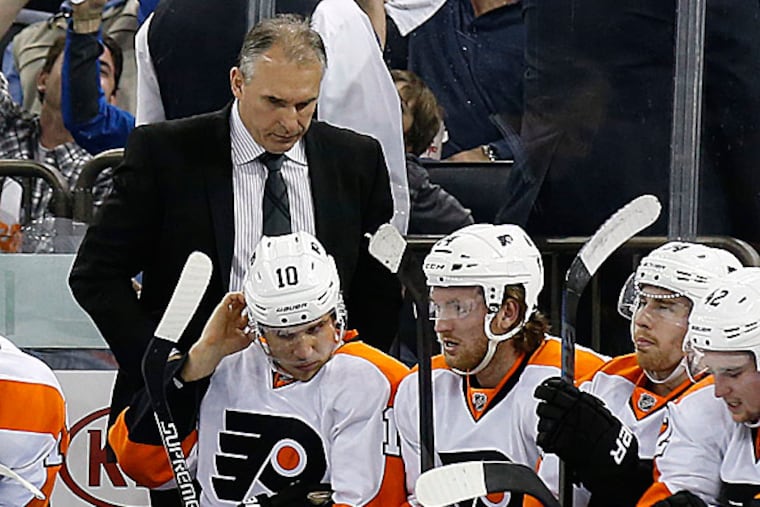Not a good sign: Berube still tinkering
From his first playoff game as an NHL head coach through his fifth, Craig Berube has made a succession of decisions that have defied the stability he had cultivated within weeks of his ascension to the job. This does not make him a poor coach. It makes him a desperate one, and it speaks to the task before him and the Flyers ahead of Tuesday's Game 6 against the Rangers.

From his first playoff game as an NHL head coach through his fifth, Craig Berube has made a succession of decisions that have defied the stability he had cultivated within weeks of his ascension to the job. This does not make him a poor coach. It makes him a desperate one, and it speaks to the task before him and the Flyers ahead of Tuesday's Game 6 against the Rangers.
After he replaced Peter Laviolette in early October, Berube didn't need much time to reverse the course of the Flyers' season. He implemented a new system of play, one that fit a roster light on speedy, creative players but loaded with conscientious ones.
Laviolette's approach may have been perfect when Chris Pronger was threading outlet passes from the defensive zone or skating the puck out himself, but it was never going to work over the long term with a group of defensemen who couldn't match Pronger's unique skill set.
Berube recognized that shortcoming from the start, and he transformed the Flyers into a club that made its back-checking and defensive responsibilities paramount. He settled on Steve Mason as his No. 1 goaltender, avoiding the flip-flopping to which Laviolette was prone, and Mason rewarded that trust with a renaissance season. Whatever structure the Flyers had lacked during Laviolette's last days as coach, they rediscovered under Berube, and it will forever be to his credit that they did.
Still, even with all those steps forward, the Flyers never quite caught up to those teams with realistic Stanley Cup aspirations. Through sheer effort, through the urgency that their slow start had cultivated, they could push themselves back into the playoff race, clinching a berth in the season's final week. But this isn't December anymore. This isn't a time when the Flyers can make up ground against one of the league's bottom-feeders or against a better opponent that could afford an off night.
This is the postseason, and if nothing else, Berube's moves against the Rangers have been revealing. Always in sports, it's more instructive to watch what a coach does than to listen to what he says. Within that context, consider the following:
Although Jason Akeson had all of two games worth of NHL experience, Berube inserted him into the lineup for Game 1 and has kept him there since. For all the praise heaped on the Flyers this season for their seven 20-goal scorers and offensive balance, Berube wouldn't have called on Akeson, who scored 24 goals this season in the AHL, if he didn't believe the Flyers needed more firepower. Akeson has validated that move. He has been one of the Flyers' best forwards in the series (which also speaks to the meager contributions from the likes of Scott Hartnell, Brayden Schenn, Wayne Simmonds, and Vinny Lecavalier).
Ahead of Game 1, Berube said the Flyers would have to change their style of play, abandoning the puck-possession game that had contributed to their turnaround for a dump-and-chase-based tactic. The aim was to inflict pressure and pounding on the Rangers' defensemen, Ryan McDonagh and Dan Girardi in particular, forcing turnovers and grinding McDonagh and Girardi down over time. Then came Game 1. The Rangers won, 4-1, and outshot the Flyers, 36-15. Berube went back to his original, season-long approach in Game 2, which the Flyers won, 4-2, in their best overall performance of the series.
Although he said that Mason's upper-body injury had healed fully, Berube elected to start backup Ray Emery in Game 3. The safer decision would have been to play Mason, but Berube said that Emery had earned the start based on his play in Games 1 and 2, and had the Flyers been able to steal a victory with their lesser goaltender in net, the complexion of the entire series might have changed. The gamble didn't pay off. Emery's shaky play contributed to a 4-1 Flyers loss and a two-games-to-one deficit.
The success or failure of each of these decisions is less interesting and relevant than the fact that Berube felt the need to make them in the first place. They were all significant departures from the norms and patterns that he had established in the regular season.
That Berube made these changes either before the series began or while it was still in its early stages suggests that he understood his team needed something new, something different, to advance to the second round. He and the Flyers have been adjusting to the Rangers, not the other way around, and a club completely confident in its system and its personnel doesn't do that.
No matter what happens Tuesday night, the Flyers have yet a long way to go to challenge for a championship. No one has made this truth clearer than the man coaching them.
@MikeSielski